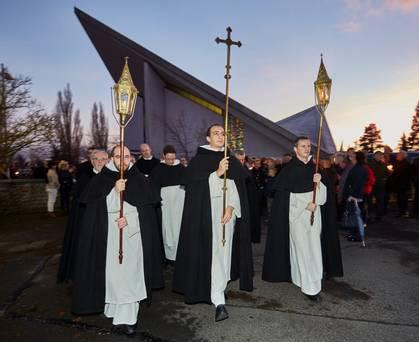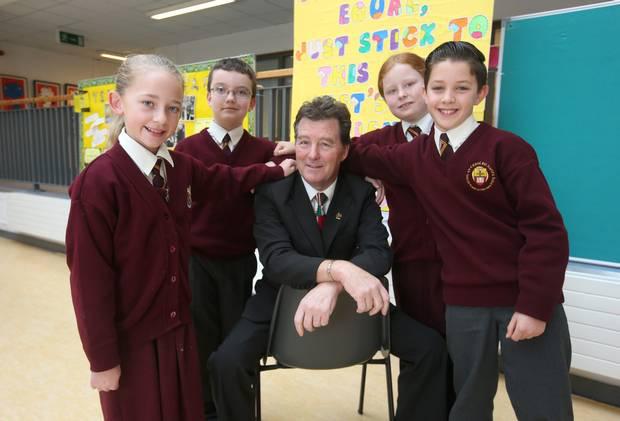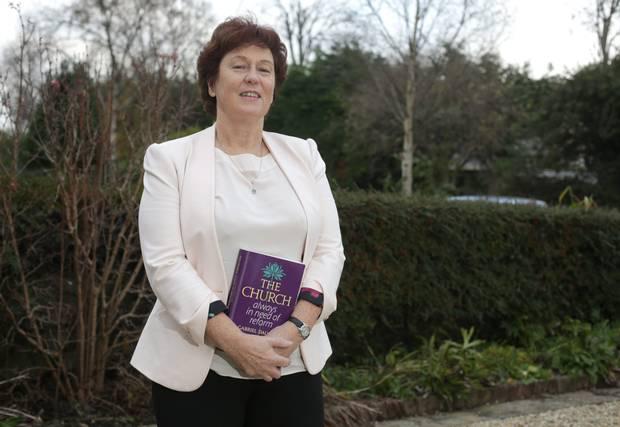|
Vanishing Catholic Church seeks salvation - can it reinvigorate itself?
By Kim Bielenberg
It was a dignified and moving retreat that is being replicated in towns, cities and country areas right across Ireland. Last Sunday, the Dominican friars moved out of their church in Athy in solemn procession for the last time, ending an ancient association with the Kildare town that goes back to the 13th century. They closed up their church, St Dominick's, for good, and the priest Fr John Harris remarked ruefully: "We can't blame Henry VIII or Cromwell this time." That was an historic reference to forced closures in times of persecution centuries ago. In the past, Protestant kings may have suppressed monasteries, but just a year short of their 800th anniversary, the Dominicans are now being engulfed by the surging tide of secularism. Father Harris said as the church closed for the last time: "This is a day no one ever wanted to see dawn, but it is here." The problem for the Dominicans, as well as the members of other orders, religious sisters and diocesan clergy is that the Catholic Church is literally dying out in many places. The Church can't find enough men to take vows of celibacy to pursue the holy life, and equally can't find enough believers to fill the pews on Sunday. And the country's once thriving population of nuns is dying off faster than the priests. The Dominicans are in a healthier state than many other orders but by the time they closed up in Athy, there were just five friars left and four of them are over 80. For similar reasons, the order is pulling out of Drogheda and Limerick, and closing centres in Waterford in Dublin. The Augustinian Friars - with an average age of 74 - are in a similar predicament, closing their church in New Ross, Co Wexford. The Augustinian Provincial Father John Hennebry said at the recent announcement of the closure it was the "end of many eras for the town" - the order has had a presence in New Ross going back 700 years. Earlier this month the once-powerful Mercy Order put the contents of two closed convents in Tralee, Co Kerry and Roscarberry, Co Cork up for auction. The lots going under the hammer - including a "Child of Prague statue housed in a brass-framed canopy", "a large carved oak crucifix" over 6ft high, and a "statue of Our Lady with foot on serpent" - seem like curious artefacts of a bygone age. Just as the Anglo-Irish landed gentry class almost vanished, leaving crumbling stately homes behind them, so is the Church departing from many of its enclaves, leaving behind vast convents, monasteries and retreat houses as monuments to its former glory. As Garry O'Sullivan, publisher of the Irish Catholic, warns: "The institutional church that came in with Cardinal Cullen in the 19th century is vanishing." Father Brendan Hoban of the Association of Catholic Priests warns that the Church is in danger of imploding because of a dramatic decline in the number of priests. "Without the Mass there is no Church, and without a priest there is no Mass," he says. When he joined the priesthood over four decades ago, 92pc of Catholics went to Mass every Sunday, but that is now down to 35pc. "In some city areas the attendance is believed to be as low as 5pc," says Father Hoban When Father Hoban, now parish priest in Moygownagh, Co Mayo, was ordained, there were 45 priests in the Diocese of Killala. That has now fallen to 30, and Father Hoban predicts that there will only be seven by the end of the next decade. "If you move on a decade or two there will be very few priests under 60. Most will be in their 70s or 80s. "There is a huge crisis in vocations. As they get older, priests will not be able to carry the workload that they have now. "A lot of priests in their 70s are under pressure to continue working, and it is not fair to them. Many of them are continuing to work into their 80s." With diminishing numbers, priests are being forced to cover wider areas, saying Masses in neighbouring parishes as well as their own. As their services are spread more thinly, it becomes harder to get to know their flock. On the blog of Association of Catholic Priests, Fr Seamus Ahearne says he likes to meet a family up to six times in preparation for a funeral. But will that kind of personal service always be possible? For a growing number of Catholics, a visit to a church only takes place for the big events in their life - baptisms, weddings and funerals - when they are "hatched, matched and dispatched". Add in First Communions and Confirmations, the odd Christmas and Easter, and that may be it. One teacher at a Catholic school outside Dublin tells of how 90 children in sixth class were confirmed last year amid great pomp and ceremony. On the following Sunday, the local parish priest asked the children who had just been confirmed to stand up. Only two boys stood up. The rest had not made it to Mass. The weekly attendance figure of 35pc at Mass still seems healthy by Western European standards, but that survey by the Association of Catholic Priests was taken in 2012. A more recent survey of Irish people in their 30s earlier this year showed that just 15pc attended a religious service each week. Among men in this age group, the figure was as low as 12pc. Much is made of the Church's continuing control of primary education and its influence in second-level schools, but this is also waning rapidly. Up to 90pc of primary schools are still under the patronage of the Catholic Church, but in many cases, the hierarchy's influence is more nominal than real. If you talk to some Catholic priests, they will privately admit that they would rather not be involved in schools, because of the administrative burden. The Archbishop of Dublin, Diarmuid Martin, has signalled that he wants to relinquish Catholic patronage in a number of schools Former Christian brother Seán Ó Díomasaigh, principal of Sacred Heart of Jesus National School in Dublin, says: "It is becoming increasingly difficult for the Catholic Church to administer, manage and be responsible for the vast majority of schools." When he started as a teacher, the Christian Brothers were a dominant force in education, but now they have almost vanished. "In my eight years as principal, the Archbishop of Dublin as patron has had no role whatsoever in the day-to-day running of the school," Ó Díomasaigh says. The principal adds that it is now time for the State to take over the patronage of schools from churches and other patron bodies. "The Department of Education pays for the teachers and the upkeep of the schools already," he says. "The present system where the Church or another organisation is a patron is unnecessarily cumbersome and bureaucratic." As it faces the decline of the clerical institutions, and vast buildings are emptied, there is much debate about how the Church can reinvigorate itself, and make itself relevant, particularly among young people. Mary McAleese, who would surely make an outstanding Cardinal if her gender did not bar her, is fond of quoting John XXIII, the reforming Pope: "We are not here to guard a museum, but to cultivate a flourishing garden of life." The Catholic theologian Gina Menzies says the Church urgently needs reform as a movement with gospel values, rather than a big bureaucratic institution. "One of the tragedies is that the Church has been incapable of building on the goodness of young people. If you look in Trinity College, you will find that the biggest society is St Vincent De Paul, but not all those members are church-going Catholics." While traditionalists cling to orthodoxy, Gina Menzies says the Catholic has always adapted in the past, and should consider the ordination of women. "At one time the Church supported slavery, banned money-lending, and didn't support democracy. In all these areas there has been change. Logically, they should be able to change in other areas too. "This applies especially to sexual morality, where there has been no new thinking. For example, homosexuality, as a condition, has long since been removed from the list of psychiatric disorders, yet the official church teaching refuses to accept this new scientific finding." It was Edmund Burke who said: "Nothing is so fatal to religion as indifference." At the moment the Catholic seems caught between two stools - incapable of putting up a fight for its traditional values or reforming itself as a more inclusive church with a simple message that will attract the young and middle-aged. Read more: Crisis of faith... the Church has been here before In the referendum on same-sex marriage, the bishops seemed to go through the motions in opposing the amendment, and many priests seemed uncomfortable with this stance. Garry O'Sullivan, publisher of the Irish Catholic, says many ordinary Catholics voted for the amendment. "I think it is wrong to assume that the same soft constituency will come out in favour of abortion, because they are very different issues," he says, adding that the solution for the Church is not simply to change its teachings. "If they change the teaching, they just become the Church of Ireland, and they are not packing in the crowds." Garry O'Sullivan believes the hierarchy has been too defeatist and needs to get organised in parish communities. "If you hear some of them talking, they just see inevitable decline in the future. They need to be there for people in the parishes, especially those who get left behind - new mothers with children, the unemployed and the elderly. Read more: 'There is no going back to the dominant Church ... In fact, we wouldn't want it' "The government are closing garda stations and post offices. There is an opportunity for the church to fill the gap in local communities along with the GAA, because there is very little else." The Church may wring its hands at its decline, but belief is still strong in many places. When Eilish Hayes, a member of the Co Cork Lotto syndicate that won €3.8m this week, heard that the winning ticket had been sold in her local shop, her first reaction was to light two candles at a statue of Our Lady. It is up to the Church to harness that devotion, and revive itself. Contact: kbielenberg@indepedent.ie
|
.
Any original material on these pages is copyright © BishopAccountability.org 2004. Reproduce freely with attribution.


